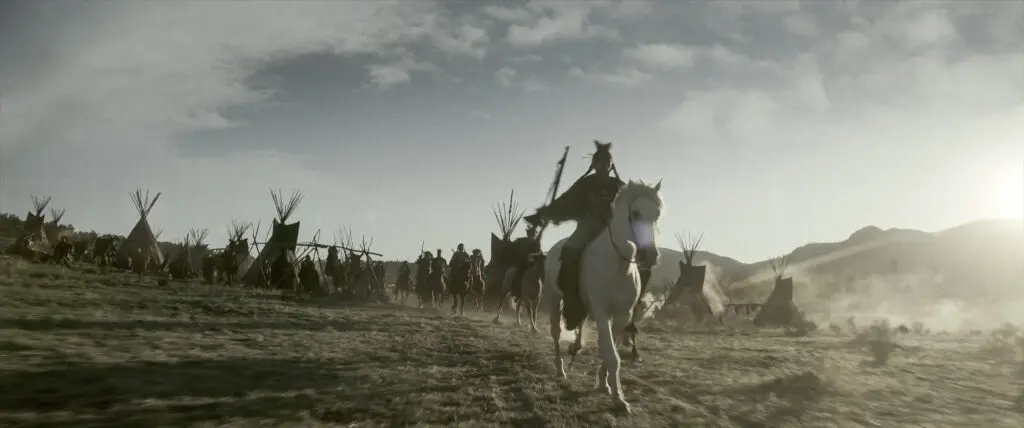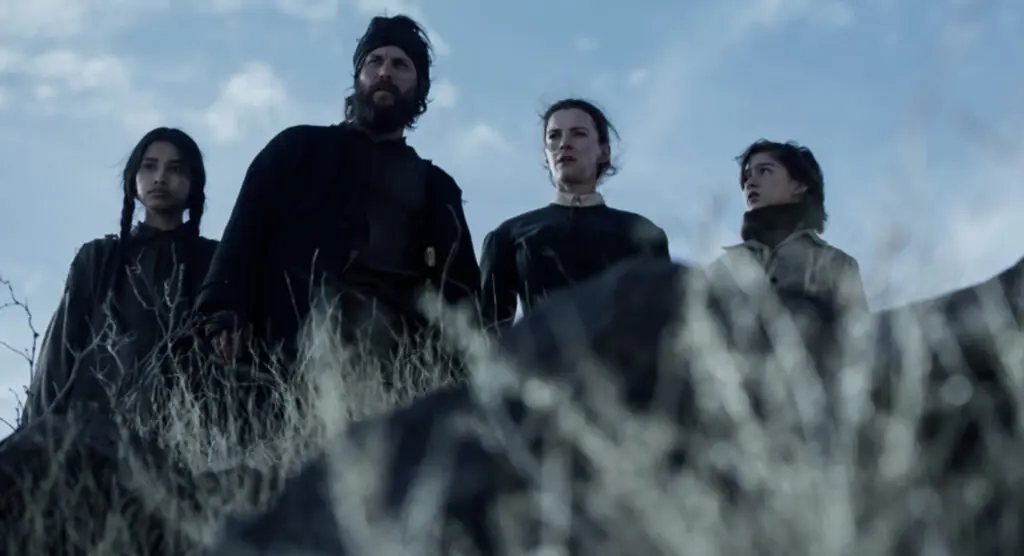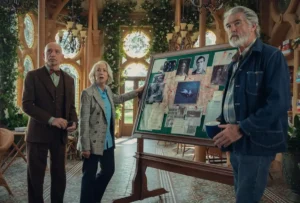Summary
American Primeval provides an unflinching account of real-life history burnished by superb detail and relentless action, but it is prone to wander a little too far from the tracks.
American Primeval is awful, but largely in a way that’s terrifically entertaining. It’s about a lot of horrible people doing a great many heinous things, and it contains, for the record, some of the most convincingly dirty fingernails I’ve ever seen on film. Should that matter? I’m not sure. But when it comes to the details of Peter Berg’s (Mile 22) six-part Netflix limited series, you can tell that the first thing on everyone’s minds was how to make every aspect seem as deeply unpleasant as possible.
There’s a romanticism to the Western genre and its cultural fixtures (see, for instance, Yellowstone) that has no place here. And it’s all under the nails; all the blood and grime and bits of scalp that cling on such that every tame interaction leaves a dirty print in its wake. Everything is seedy and unclean, not just morally, but literally. And there isn’t a cowboy in sight.
This is American history not as fluffy entertainment but as a sobering reminder. The nexus of the story is the real-life Mountain Meadows Massacre, which is depicted in the premiere in a startling long-take tracking shot that doesn’t let you come up for air. In 1857, when the series is set, the Utah Territory was contested by the U.S. Army, the Church of Jesus Christ of Latter-day Saints, and various Native tribes, particularly the Shoshone and the Southern Paiute. The massacre – perpetrated by the Mormons and the Paiute, blamed on the Shoshone, and investigated by the Army – provides the black hole gravity which keeps everything else in a steady orbit.
American Primeval finds a compelling hook to represent each point of view. The earliest and most consistent we get is that of Sara (Betty Gilpin, Skull Island) and her son Devin (Preston Mota), who’re making their way West for initially unclear reasons and require a guide to keep them alive. They hitch themselves to a wagon train traveling the Old Spanish Trail towards California and rumble straight into the massacre. From there, they’re shepherded by Isaac Reed (Taylor Kitsch, Painkiller), a taciturn tracker raised by the Shoshone, and are led out of and away from an increasingly knotty plot that emerges from the massacre’s ashes.
Brigham Young (Kim Coates, White House Plumbers), the real-life president of the Church of Jesus Christ of Latter-day Saints and Governor of the Utah Territory at the time, wants to consolidate power in the region and needs to obscure Mormon involvement in the massacre, so his lackeys are dispatched to clean up any loose ends while he attempts to purchase Fort Bridger, an important local trading outpost, from Shea Whigham (superb as always). Sara and Devin are witnesses, as are a Mormon couple, Jacob (Dane DeHaan – A Cure for Wellness, The Kid) and Abish (Saura Lightfoot-Leon, late of The Agency), who’re separated in the aftermath. Jacob falls in with Young’s personal army, the Nauvoo Legion, and then a group of bounty hunters led by Virgil (Jai Courtney – Buffaloed, Jolt), while Abish is taken in by Red Feather (Derek Hinkey), the chief of Wolf Clan, a rogue faction of the Shoshone tribe hellbent on winning their land back from the white man.

Derek Hinkey as Red Feather in American Primeval Cr. Netflix © 2024
You can see how combustible these elements are – and how stacked the cast is – just from that paragraph, so I won’t bore you with any more plot specifics. Needless to say, a lot of these factions are going to kill each other in rather violent ways, and American Primeval is going to present this violence to you as relentlessly and horrifyingly as possible.
This is the point. There are others, of course, but the central driving thesis of this show is that West was won – or lost, depending on your perspective – with blood and arrows, not with niceties. The complexities at play – arguments over territory, preservation of culture and land, religious expression, bigotry, superstition, and the rule of law, to name a few – are fun to chew over and add interesting color to the plot but ultimately degrade into the same thing, which is exclusively dirt and fire and death.
It can get wearing. American Primeval isn’t all action all the time, but it’s as close as you can get to that while still telling a coherent story, not that it always necessarily succeeds on that level if we’re being frank. So many point-of-view characters are difficult to keep track of, and sometimes people will disappear for long enough stretches that when you check in with them you have to remind yourself what they were up to. This is especially true of Jacob, whose meandering plot gets unnecessarily wacky and has an abrupt payoff.
By the end, too, Sara and Isaac, who’re ostensibly the protagonists, feel totally disconnected from the wider massacre plot, almost like they’re in a completely different show. While their story is largely excellent and ends in a way that feels deeply earned, it might have been nice to keep them tethered to a story that they had a valuable connection to, especially Isaac.
But this, I think, is American Primeval’s reach exceeding its grasp. It’s an ambitious show that strives not only to furnish the age-old Western genre with a near-unprecedented degree of detail and authenticity but also to slightly reinvent it, to change the terms of whose stories it can tell and the ways in which they can be told. It deserves credit for that, if nothing else, even if you might feel the sudden urge for a shower afterward.
RELATED:




